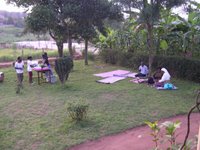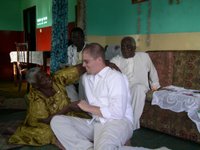Editor's Note: I know this is long, but stick with it. It's pretty interesting. I'll do my best to pare down the parts that seem a little long. Happy reading! P.S.- You'll note that changes have been made to this post several times. I finally have accurate info on dowry, which will be enriched by my participation in Kwanjula (see below).So I'm the best man in a Ugandan wedding, and I thought my faithful readers would want to know a bit about some of the customs here. In days past and in places outside Kampala, a family threw the wedding party for the bride and groom at the home of the bride. Now the family asked this particular groom for 70 cows as an intimidating tactic. He can actually bargain for and bring whatever he wants as long as he includes a few essential items (more on that later) Since at the
kwanjula (introduction ceremony, which will happen a week before the wedding), the groom is not allowed to speak, the negotiation part should be interesting. I'll say more about the groom's silence and the essentials of dowry after I've attended and participated in the kwanjula, but for now let's concentrate on cattle and parties. Mooooooo.
The bride's family and the groom's family put on the wedding party, or
mbaga, with the help of their villages. Mostly the brides family friends, neighbors, and clanmates would help out by bringing whatever they could manage, sort of like a potluck.
Mwenge (crude brew--like moonshine made from bananas and sometimes distilled with sorghum) was brewed, mom made a cake, and they all had a big drunken bash complete with local musicians--sounds like fun, right? Only problem is, now that people live in the city and they either a) don't have the land in the village anymore or b) don't think it makes sense to haul 100 litres of
mwenge and a cake from the village (wherever that may be) to Kampala, they have to hire some professionals to help them put on a proper shindig.
Since the average Ugandan in Kampala makes about 400,000-800,000/= (shillings) a month (about $200-400, a living wage in Kampala) with the growing middle class doing a bit better than that, people need to raise some money. I would estimate that the average modest wedding in the city costs somewhere between 10 and 30 million shillings, so that's a lot of bread (or
Matooke as it were--that's the staple food here) for your average Kigozi. To get the job done, they have wedding meetings, one of which I attended this evening.
Now these meetings are meant for the sole purpose of raising funds for the bash, but I must admit that they are quite a lot of fun. If you want to make it through one of these things, just bring lots of small change (1K shilling bills and coin change, like stuffin' your pockets with quarters), your smile, and a giving heart. Friends get invited by other friends through the use of pledge cards. Depending on how well someone knows the couple, they might contribute anywhere from 20K/= to 500K/= at a given meeting or on a given pledge card (that's between roughly $10 and $225).
So the first item on the agenda is always prayer, which the chairperson leads or asks someone to lead. He or she is almost always a relative of the couple. After prayer, the "chairman's bag" goes around the group for an initial donation, which he uses to secure locations for future meetings or contribute to whatever particular fund is suffering. There have been between 10 and 15 people at both of the meetings I've attended. These folks are there to support the couple in whatever way they can, but mostly with their cash.
After the chairman's bag goes around, it's time to go through the budget. That's exactly what the chairman does: he goes through the budget, item by item, recognizing the recent contributions and applauding them, asking for support for those items which have been neglected. It was at this point in my first meeting that I decided I needed a drink and contributed some money to some wine for this party.
After the budget, it's time for the auction. Now I've seen plenty of auctions in my day, but these are something else. Someone buys a gift and wraps it (might be the bride, might be the groom, might be the chairman . . . ) and then it's time to pick an auctioneer. At both of the meetings I've been to, the chairman picks three possible candidates to be the auctioneer, usually volunteering himself in that mix. These three get up and campaign NOT to be the auctioneer, and the one who raises the least money has to do the deed. It's not that bad, but it's uncomfortable at first, especially when you don't talk like an auctioneer. As you can plainly see, I didn't raise enough money in this process, so I was the auctioneer this evening.
It's not that interesting to tell you about what bids were made and so on, but what is interesting is that bids aren't made with raised hand or numbered paddle, they're placed with cash. That means that for each bid you make, you put that much cash in the bag. For example, if bidding starts at 5000/=, a person can reduce that by however much she pleases to "unseal" the item. So we collect small donations until someone can afford to "seal" it again for herself or someone else. As you go, you don't want to bid too big because if you get outbid, that large bid is already in the bag and you have to come up with more cash in order to bid again. (Note: the first time I attended one of these babies, I didn't understand the rule and ended up spending 25,000/= on an auction item that I didn't win.) This all goes on for about a half hour, and people make silly rules like: "1,000/= so that the auctioneer can't talk" or "1,000/= supports a song and dance from the chairman," and in order to remove these bidding curses, someone either has to bail the target out or the target has to be filthy rich and bail himself out.
At the end of the day, the group raises about 100 times what the gift cost in the first place, and the couple can buy some more wine to make these people happier at the wedding so that they won't be thinking about what percentage of the cake came out of their pockets.
That's really about it. Then the auctioneer counts the cash and a great announcement is made to celebrate whatever amount was raised by the auction item. The crazy part? The couple doesn't even have to be there if they've got some other important wedding planning to do, like marriage counseling or meeting with the caterer or something. That's right happy couple, while you're out working your butts off to make this thing happen, we'll be right here raising the cash to support you. Now that's community. So even though people don't bring stuff from home like a couple of trees worth of bananas to feed the guests, they still contribute as a community of friends to help their friends throw a good party.
I for one have invested in wine. This particular couple doesn't really drink, but I think a good party ought to have some libations and as long as nobody loses their
matooke after too much
mwenge, that's okay. So cheers to the happy couple. May your auction item bring as many ridiculous rules as it does shillings, because I'm not walking to the reception and there had better be something to eat and some good music when we get there.
















